成人高等教育与德国劳动力市场中移民的应对策略
IF 1.9
4区 教育学
Q2 EDUCATION & EDUCATIONAL RESEARCH
引用次数: 0
摘要
关于教育回报和劳动力市场结果的文献越来越关注移民融入和适应过程中的技能错位。研究人员研究了官方确认先前技能以及参与培训和职业计划的有效性,将其作为扩大东道国劳动力可能性的有效资源。然而,很少有研究涉及成人高等教育的回报,特别是正式学历如何影响熟练工作机会和劳动力状况。在这项研究中,我在此调查在新的劳动力市场背景下,在未匹配和先前资格价值不足的背景下,东道国资格的有效性。利用德国社会经济小组研究的数据,我比较了持有德国学位的移民和只持有外国学历的移民之间的高等教育学位对他们在当地市场的职业成果的影响。我发现,对于那些具有本地资格的人来说,获得与个人技能和职业地位相匹配的专业工作的机会更高。这表明,高等教育形式的当地资本具有“有效”证书,有助于移民在新的劳动力市场环境中取得更好的成果。本文章由计算机程序翻译,如有差异,请以英文原文为准。
Adult tertiary education and migrants’ coping strategies in the German labour market
ABSTRACT Literature on returns to education and labour market outcomes has been increasingly focusing on skill missmatch with regard to migrants’ integration and adaptation processes. Researchers have studied the efficacy of official validation of prior skills as well as participation in training and vocational programmes as valid resources to expand labour possibilities in the host country. Fewer studies, however, account for the returns to adult higher education, in particular how formal credentials influence skilled-job chances and labour status. In this study, I hereby investigate the effectiveness of host country qualifications against the backdrop of miss-match and under-value of prior qualifications in the new labour market context. Using data from the German Socio-Economic Panel study, I compare the effects of tertiary education degrees between immigrants holding German degrees and those who only possess foreign credentials on their occupational outcomes in the local market. I find that the chances of obtaining a professional job that matches individuals’ skills as well as their occupational status are higher for those with local qualifications. This suggests that local capital in form of tertiary education pertains ‘valid’ credentials that help migrants to achieve better outcomes in new labour market contexts.
求助全文
通过发布文献求助,成功后即可免费获取论文全文。
去求助
来源期刊

Studies in Continuing Education
EDUCATION & EDUCATIONAL RESEARCH-
CiteScore
4.70
自引率
6.70%
发文量
22
期刊介绍:
Studies in Continuing Education is a scholarly journal concerned with all aspects of continuing, professional and lifelong learning. It aims to be of special interest to those involved in: •continuing professional education •adults learning •staff development •training and development •human resource development
 求助内容:
求助内容: 应助结果提醒方式:
应助结果提醒方式:


